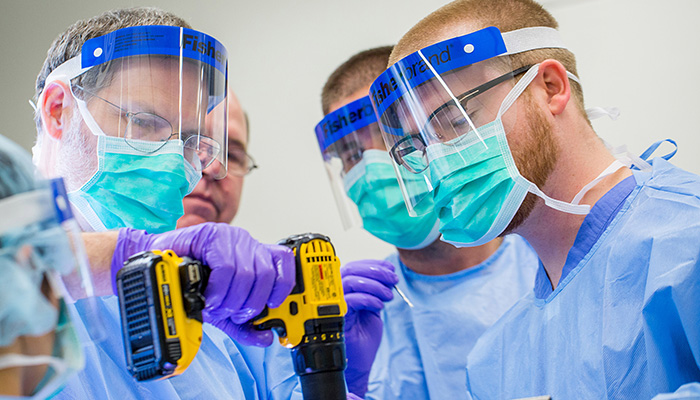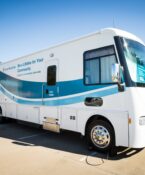Where medicine meets mechanical engineering
Share this story on Twitter
|
Following a total knee replacement, patients often discover that their new implant does not feel or function as naturally as they hoped.
But what if there was an implant that closely mimicked a patient’s original knee? That’s exactly what teams from UNT Health Science Center and the University of Texas at El Paso hope to identify as part of a unique project that meshes mechanical engineering and medicine.
“Typically knees move completely differently after a knee replacement,” said Addison Wood, a DO/PhD student. “We’re looking for a knee that in the end performs more like a natural knee.”
More than 150 types of implants are used today in total knee replacement surgery. As part of his research, Wood has been testing various models on loan from Biomet, an Indiana-based company that designs and manufactures surgical products.
Although companies have tried to create knee designs that function more naturally, there is little data that shows how well they work, said Dr. Russell Wagner, Chairman and Professor of Orthopaedic Surgery.
The collaboration involving two schools and students from different fields is a unique approach. First the UNTHSC team implants the devices in the knees of donated cadavers. Then the knees are tested in a simulator by Joshua Green, a mechanical engineering student at UTEP.
The simulator, which was invented at UTEP, examines how different knee designs move and function under normal muscle loads during normal activities, Dr. Wagner said.
While many different knee implants are used in the United States, it’s not known which deliver the best results, Wood said. His goal is to give surgeons a way to accurately compare all of the designs.
“What works for one person who wants to be able to walk up stairs might not be best for the grandpa who wants to play ball with his grandchild,” he said. “The alignment of a knee implant is different for everybody, but we want to make it better for each person.”
Knee implants that restore a natural gait are more important than ever as aging baby boomers who suffered injuries earlier in life are faced with undergoing knee replacement surgery, Dr. Wagner said. The average total knee replacement patient used to be is in his 60s and expected the implant to last the rest of his life.
“Now patients are in their 50s or younger and are more demanding of implants,” Wood said. “They want implants that allow them to be more active and do the things they enjoy in everyday life.”


![Uyen Sa Nguyen Scaled[58]](https://www.unthsc.edu/newsroom/wp-content/uploads/sites/16/Uyen-Sa-Nguyen-scaled58-145x175.jpg)



Social media